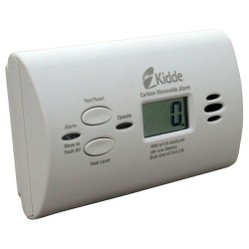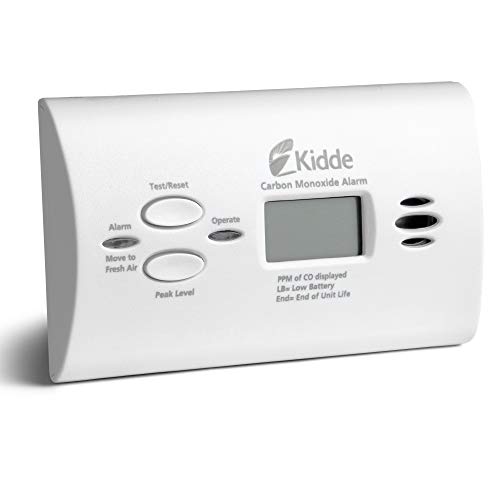We hear it on the news every winter. A person or family suffers from monoxide poisoning due to some type of heater being used without the proper ventilation. This can easily be eliminated by installing a affordable and reliable alarm. If you use gas, oil or kerosene in a heater for the house or garage you run the risk of illness or worse yet death. In the winter months the threat of carbon monoxide is a very real concern for many. It can get in your home anytime fuels are burned to generate added heat for your home. Carbon monoxide poisoning happens when gas, oil, wood, charcoal or kerosene is burned in a confined space, such as a home sealed off for the winter.

Carbon Monoxide Alarm with Digital Display
by katiem2
If you or someone in your home or garage burns oil or kerosene heaters a carbon monoxide detector can keep you safe from carbon monoxide poisoning. Prevent illness with an alarm.
What Causes Carbon Monoxide Poisoning?
Carbon monoxide poisoning is easily avoiding by taking a few precautionary measures.
Carbon monoxide poisoning can happen if large amounts of these fuels are released in your home at one time, or smaller amounts lingering for several days. Anyone burning these types of fuels should have a monitor to insure no one becomes seriously ill. The signs of poisoning from carbon omissions in the home include dizziness, headache, tired and nausea. Seek medical attention if you burn fuels in your home and experience any of these signs. The best prevention is making certain a chimney is in place and working condition. Burning any of these fuels without the proper ventilation creates a very unsafe environment. You can monitor your home and keep your family safe with the small investment, for under twenty five you can buy the monitor seen here today.
Safe Heating with Gas or Kerosene
Heating with gas, coal, wood, oil or kerosene is very dangerous causing serious illness or even death if not used properly.
The stoves or other heating options using any such gases should be vented outside the home or area were humans stay. Chimneys don't always work and should be evaluated each season and cleaned making sure no gases back up into your home.
Poisoning From Car Exhaust
Closed garages with cars or other autos left running in them store carbon monoxide harming anyone in the garage.
The toxic gases can also leak from an attached garage into the house causing a threat in the home as well. Working in a closed garage with a kerosene heater creates the same dangerous threat. Always make sure any area where a gas burning stove of any sort is used is well ventilated and more importantly not sealed off.
Note: Gas burning generators also omit the same dangerous fumes. Take the same precautions you would with a gas burner when using generators in or around the home.
Do You Use Gas Heaters?
Do you use these types of heaters in your home or garage and if so did you realize the danger?
You might also like
How to Glue Anything TogetherEver wonder what type of glue you need to glue something back together? You'...
How to Shop Amazon.com to Get the Best Deals and Free ShippingAmazon is a giant in online sales, where you can find just about anything. Le...
Self Defense SafetyLearn the best tactics for self defense and safety. Read a in-depth review t...




 Guide to Sourdough Bread Using Cups, Ounces and Spoon Measurementson 09/27/2025
Guide to Sourdough Bread Using Cups, Ounces and Spoon Measurementson 09/27/2025
 Parents Discover 3 Stress-Free Ways to Readingon 09/25/2025
Parents Discover 3 Stress-Free Ways to Readingon 09/25/2025
 How to Get More Reviews for Your Book: Why Authors Love Pubbyon 09/07/2025
How to Get More Reviews for Your Book: Why Authors Love Pubbyon 09/07/2025
 3 Best Blue Lotus Oils And Benefits That Wow Youon 06/03/2024
3 Best Blue Lotus Oils And Benefits That Wow Youon 06/03/2024




Carbon Monoxide Alarm with Digital Display
katiem2, It's scary about the build-up you mention of toxic gases in garages, particularly those attached to houses.
Pam, That is a lot. With these types of heat sources you must make sure you have the proper amount of ventilation and that it working properly free of dirt build up or such as birds nest and the like,and other possible nest. Anytime the detector alarm goes off, leave the house and call your city or county utility company. They should have someone come out with a commercial monitor to determine if the levels are dangerous plus tell you what you can do to avoid such a circumstance. Start today by calling your local utility company and or gas supplier asking them who you should contact in case the alarm sounds. Great question thanks for asking. I once bought a new gas stove, after the install I kept noting a faint gas odor, I was told that's to be expected for a while. I thought NOT! I called my city utility company and they sent someone out with a monitor. Check it, found gas present in the air, pulled out the stove and checked the metal hoses, pointed out where I need to make some adjustments, I made a few adjustments and it was fine.
I have had a CO detector and I'd like to hear more about what to do when the one you own goes off? I have a chimney ( wood burning stove) and have an oil furnace.